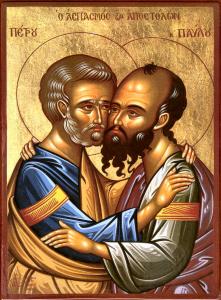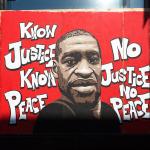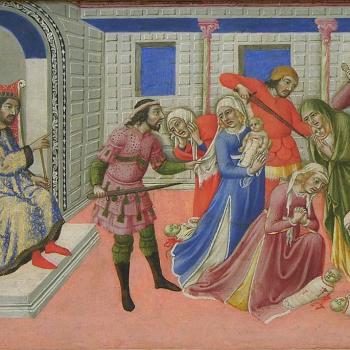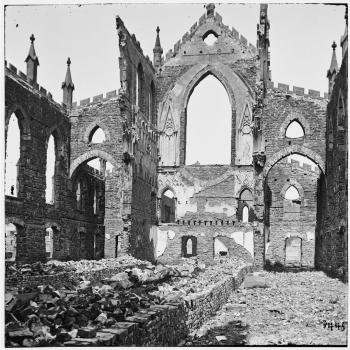
Peter and Paul started their journey in radically different states of life, but they would end their journey together, understanding and supporting each other as they died serving Christ. Peter was a fisherman, and as a fisherman, he might have been given an elementary level of education (as it was not unknown at the time). Paul, on the other hand, was a religious scholar; his life was, in many respects, a life of study, and he studied not only the classics of his religious tradition, but from the culture at large. Paul’s writings show us that he had some knowledge of Greek philosophy and literature, enabling him to talk with and engage the Gentiles through sophisticated religious arguments. It was not education which made Peter and Paul leaders of the Christian faith (though such education did help Paul in his discussion of the faith); it was their unique (and differing) connections with Christ and the Holy Spirit which made them who they were.
Peter knew Christ in person. He had travelled with Jesus. Indeed, he was propped up by Christ to serve as the leader of all his disciples. We do not know all the reasons why Jesus chose Peter. Nonetheless, from the Gospel accounts we have been given, it seems that Peter showed greater spiritual acumen than the rest of the disciples, enabling him to speak and proclaim the truth while the rest remained silent:
Now when Jesus came into the district of Caesarea Philippi, he asked his disciples, “Who do men say that the Son of man is?” And they said, “Some say John the Baptist, others say Elijah, and others Jeremiah or one of the prophets.” He said to them, “But who do you say that I am?” Simon Peter replied, “You are the Christ, the Son of the living God.” And Jesus answered him, “Blessed are you, Simon Barjona! For flesh and blood has not revealed this to you, but my Father who is in heaven. And I tell you, you are Peter, and on this rock I will build my church, and the powers of death shall not prevail against it. I will give you the keys of the kingdom of heaven, and whatever you bind on earth shall be bound in heaven, and whatever you loose on earth shall be loosed in heaven” (Matt. 16:13-19 RSV).
Throughout his life, Peter often found himself to be a vessel for God’s revelation. God would work in and through him, correcting him when he was wrong, and what made Peter great was that he was willing to accept such correction. It allowed him to also listen to others and heed what they told him, such as when Paul confronted him because he did not properly engage the Gentile converts. In this way, Peter did not act like most leaders; he was willing to humble himself and listen to what was needed instead of using his position to impose himself and his own desires upon the church.
Paul, on the other hand, was often self-assured, making him sometimes very thick-headed. When he thought he knew what needed to be done, he would undertake it with full zeal, so that he could and would do many things which were bad but done with the best of intentions. His early contention against the Christian faith was a result of that zeal. He loved God, but he didn’t understand God and God’s ways properly. His studies taught him much, and they gave him great insights, but they did not take into full consideration the implications of God’s love for the world. He probably understood God loved the world, but he did not reason out what that love implied. He loved God, and he even loved others, and it was this love which would be the foundation for his salvation, because it meant, though his actions were wrong, though his understanding which informed his actions was wrong, beneath all the wrongdoing there was a core which could be touched and addressed. He had to transcend himself, to overcome himself and the way his ego interfered with his connection with God. This is exactly what happened in his encounter with Christ. He was taken outside and beyond himself so that he could learn truths which transcended his own wisdom and education, truths which transcended human comprehension, and once he had become acquainted with them, he was never the same. What he learned he would, throughout the rest of his life, try to understand and explain. Nonetheless, he knew much of it was something he could ever properly express with words:
I must boast; there is nothing to be gained by it, but I will go on to visions and revelations of the Lord. I know a man in Christ who fourteen years ago was caught up to the third heaven — whether in the body or out of the body I do not know, God knows. And I know that this man was caught up into Paradise — whether in the body or out of the body I do not know, God knows — and he heard things that cannot be told, which man may not utter (2 Cor. 12:1-4 RSV).
After his encounter with the risen Christ, Paul realized what he didn’t understand before: human thoughts and expectations, human ways of interpreting the world, were all faulty, as it came from a very limited, social perspective. His mystical experience gave him a transcendent perspective. He would understand how foolish human arguments were, even as he would understand human conception of strength and weakness were judged by the wrong criteria. When he found himself suffering as a result of his change of heart, experiencing the pain and sorrow he had previously imposed upon others, most people would think this was because Paul had become weak. If he were strong, he would overcome such opposition and make those who desired him to suffer to suffer instead. He had to be weak if he could not stop being manhandled and abused by others, but he himself said it showed how strong he had become, that he could and would endure it – and all things – so that he could fulfill what Christ would have of him:
Five times I have received at the hands of the Jews the forty lashes less one. Three times I have been beaten with rods; once I was stoned. Three times I have been shipwrecked; a night and a day I have been adrift at sea; on frequent journeys, in danger from rivers, danger from robbers, danger from my own people, danger from Gentiles, danger in the city, danger in the wilderness, danger at sea, danger from false brethren; in toil and hardship, through many a sleepless night, in hunger and thirst, often without food, in cold and exposure. And, apart from other things, there is the daily pressure upon me of my anxiety for all the churches. Who is weak, and I am not weak? Who is made to fall, and I am not indignant? (2 Cor. 11:24-29 RSV).
Peter and Paul, after Paul’s conversion, were able to come together and serve Christ together. Yes, they would struggle with each other, working to correct and perfect each other in their own ways, so Paul would sometimes serve as Peter’s conscience, while Peter would make sure Paul’s zeal did not get the best of him. Peter made sure Paul worked with the rest of the apostles instead of thinking he could do all things himself. They both made sure that the church, and the good of the church, and not just their private interests, were at the forefront of what they did. They helped refine each other, so that, despite all their conflicts, they could be united together, in life as well as in death. In the end, as their hearts were dedicated to Christ, they were able to form a bond together based upon that love. They would establish the See of Rome together, so that it would take the best qualities from both of them. Its bishops would serve as a successor, not only to Peter, but to Paul as well.
Peter and Paul, coming from vastly different backgrounds, holding different demeanors, nonetheless, in Christ, were able to come together as one. This shows us how differences remain even in unity. Peter and Paul remained, in their own way, vastly different from each other. But instead of using such difference to divide up the church, they saw it as a good, as they helped perfect each other. And to this day, Christ continues to bring us all together so that we can be one, telling us to love one another, accept our differences, and work together, refining each other with those differences, so that we can then all be made great, not by ourselves, but by each other.
Stay in touch! Like A Little Bit of Nothing on Facebook.
If you liked what you read, please consider sharing it with your friends and family!












